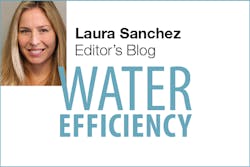In an effort to better understand women’s participation in the water industry and the water supply network, last May Water Efficiency magazine explored the topic by way of an interview with Kirsten deVette of the International Water Association.
We learned that in many parts of the world women bear the primary responsibility for water collection. They nourish their families with it and often play a vital role in water economies. Water is fundamental for health, safety, industry, and food security. And an increasing number of women are taking on important roles within the water industry.
This year we reached out to Lisa Riles, the global business unit director for residential and specialty at Xylem AWS for her perspective. She has been with the company for 27 years in various roles of leadership and increasing responsibility. We’re inspired by her grace, confidence, and intelligence.
Water Efficiency (WE): What is it like to work in a predominantly male industry? And what advice would you share with young women considering a career in water?
Lisa Riles (LR): Over the past 27 years, I have grown up both personally and professionally in the water industry. I can truly say that the people make it the best industry to have a career in. I’ve been fortunate to be a part of a sensational team and learn from some of the kindest, most hard working, down-to-earth, and talented professionals, who are passionate about solving water challenges. I have the utmost respect for them as we share a common goal to provide the best solutions possible.
In addition to working with and learning from my colleagues and peers, our customers are paramount to our success. Many of them have been in the industry for generations, work hard, and appreciate that we provide quality products. In fact, most see the GWT name as synonymous with theirs, making it feel as though we’re a family working together.
The water industry has a great future and with water being a critical global resource, it’s an attractive industry for young professionals. The water industry especially resonates with women. Countless women around the world, many of whom reside in underdeveloped countries, experience water scarcity daily. They also experience the social, economic, and educational effects of water shortage. As women, we can work together to provide efficient water solutions and make a global impact.
My advice for young women considering a career in water is to take on the challenge and pursue a job in the industry. Then, make an effort to cultivate strong relationships with other industry professionals. Women bring an important perspective and unique skill set to the industry, and it’s important to learn from and empower each other to succeed.
As in any male-dominated industry, women have to more vocal about the knowledge they have, including knowing their products and market(s) inside and out. And, as with many other industries, we have to work hard to show our value in the workplace. When women demonstrate a deep knowledge of the water industry, their company’s product portfolio, the needs of the market and our customers, and the way the industry is evolving they can highlight their place in the arena.
The industry is looking for dynamic women to make a difference, so accept that new job and make a difference globally. Water is a precious resource that we need to protect, and we need strong women to help support this mission.
WE: How do your equipment and technologies address efficiency at the water-energy nexus?
LR: At Xylem, we are focused on enhancing drives and remote monitoring technology to help our customers save energy and manage their systems if the most efficient way.
A few months ago, we released the fifth generation HYDROVAR, an intelligent pump controller that accurately adapts to system demands. This helps end users realize cost and energy savings while achieving optimum system performance. It can reduce the energy consumption of a pump by as much as 70%.
WE: Let’s talk about the digital future of water. How do you see analytics and big data affecting the productivity of water utilities today?
LR: The Internet of Things (IoT) is a growing trend across all major industries. In the water industry, we are experiencing an increase in the number of companies that are replacing traditional water pumps with smart pumps and integrating technology, like our soon-to-be-released AqWiFi product, that deliver data directly to end users.
We also recognize the need for water utilities to better assess and improve performance to promote efficiency, transparency, and accountability. Benchmarking has become an important industry practice to set, promote, and achieve performance goals. Smart technology like Automated Meter Reading (AMR) and Advanced Metering Infrastructure (AMI), offered by Xylem’s Sensus brand, help utilities benchmark performance and optimize their infrastructure.
AMR automatically collects consumption, diagnostic, and status information from water meters. This eliminates the need for a manual meter read, which improves accuracy and streamlines the data collection process for utility workers.
AMI plays a critical role in a smart water system—that includes smart meters, communication networks, and data management systems—by enabling two-way communication between utilities and customers. This allows utilities to make decisions based on performance and insights in near real time.

